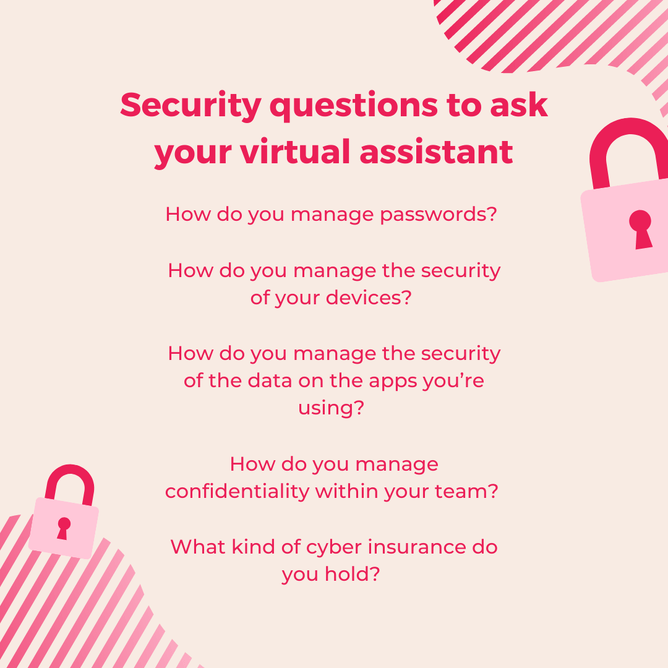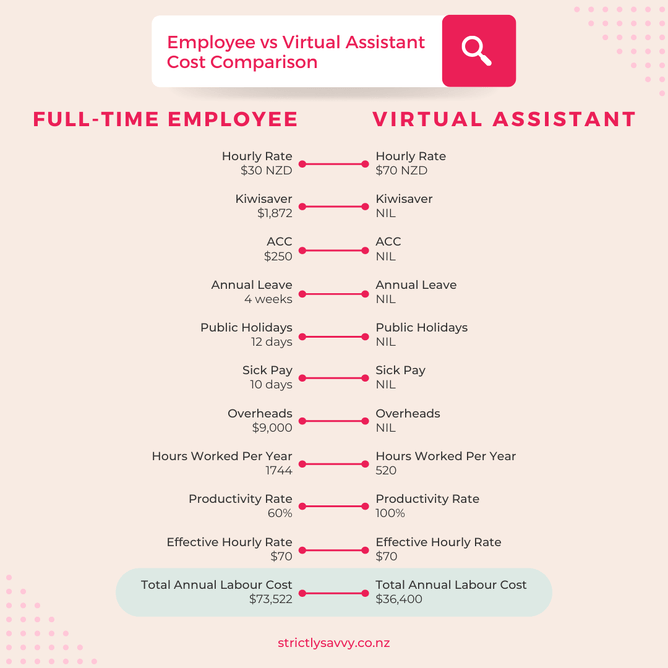Hiring a virtual assistant (VA) is a big decision. You’ve probably done your research, weighed the pros and cons, and thought through your next steps. But if you’re still on the fence, you’re not alone.
We’ve heard plenty of questions from business owners before they take the leap, so let’s tackle some of the most common concerns and give you the clarity you need.
What if my VA’s work isn’t what I expected?
Success with a VA starts with clear communication and expectations. If you’re worried about things not being done the way you’d like, here are a few key steps to set your VA up for success:
Provide detailed instructions - Written or video guidelines ensure they understand your processes.
Set expectations on updates - Let them know how and when you’d like progress updates.
Allow for learning - Mistakes can happen, but addressing them directly (instead of silently fixing them yourself) helps your VA improve.
Give constructive feedback - Your VA wants to do great work! A little guidance goes a long way in refining their approach.
If things aren’t quite working, check in with your VA. Chances are, they’re happy to adjust their approach to meet your expectations.
How do I know my information is safe?
Security is a big concern for many business owners, and rightfully so. Just like with employees, a VA may have access to confidential or commercially sensitive information. Here’s how you can ensure your data stays protected:
Have them sign an NDA - Any reputable VA should be willing to sign a non-disclosure agreement.
Check their confidentiality policies - A professional VA or agency should have clear security measures in place.
Ask about background checks - Many VA agencies conduct police checks before hiring their team.
Your VA wants to maintain your trust and long-term working relationship—they won’t risk their reputation by mishandling your information.
How do I know my data is secure?
This a topic that we cover in our 'security questions to ask a virtual assistant' blog, and it's absolutely something that you should be checking when you engage with a virtual assistant.
Most VAs have robust security measures in place to keep your information safe. At a minimum, you should expect:
A secure password storage tool (like LastPass or 1Password)
Two-factor authentication on all accounts
Antivirus and malware protection on their devices
Remote-wipe capability (tools that allow their devices to be wiped if needed)
If security is a concern, ask your VA about their specific protocols - you’ll likely find they have strong protections in place.
Is it really worth the cost?
We break down the cost of a VA in more detail here, but the key takeaway is this:
VAs are often more cost-effective than hiring an employee - You’re not paying for benefits, sick leave, or downtime.
You only pay for productive time - Unlike an employee, a VA tracks billable hours, so every dollar you spend goes toward completed tasks.
Your time is valuable - What could you achieve if you weren’t stuck in admin work? Hiring a VA lets you focus on revenue-generating activities.
If you're unsure whether a VA is right for you, check out our ROI Calculator to see how much money you could actually make by outsourcing tasks to a VA. This tool helps you calculate the real financial impact of freeing up your time for high-value, revenue-generating activities.
The hourly rate for virtual assistants is based on the average cost across the virtual assistant industry in 2025.
Hours Per Year Worked for a full-time employee is 2,080 hours, minus leave and public holidays for employees.
Hours Per Year Worked for a VA has been calculated at 520, (10 hours per week). We have found this to be equivalent to a full-time equivalent role which has been streamlined, automated and 100% productive.
The average annual Overhead cost for an employee is estimated at $9,000 per year, covering expenses such as courses and training, conferences, computer equipment, desk and peripherals, kitchen supplies, work from home allowances, travel, office supplies, health and safety equipment, health insurance and other employee benefits, mobile phone plan, software subscriptions, and team-building activities.
How do I track what my VA is doing?
VAs track their time using tools like Harvest or Toggl giving you full transparency over how long tasks take.
If needed, your VA can provide detailed reports alongside their invoices so you can see exactly where your hours are going.
What if my VA isn’t the right fit?
Sometimes, despite best efforts, a working relationship just doesn’t click. Here’s what you can do:
If working with an agency - You may be able to switch VAs to find a better match.
If working with an independent VA - Review your contract terms. Many VAs offer flexible agreements that allow you to end services with notice.
Ensure you’re not locked into a long-term contract - Always check this before hiring a VA.
Ready to talk to us about hiring an award-winning virtual assistant?
Book a free discovery call - we’ll talk through your needs and see if a VA is the right fit for you.




